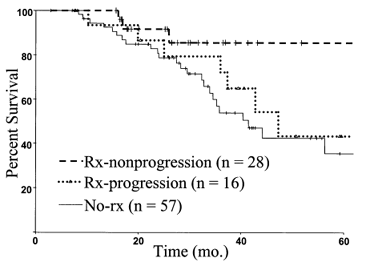# 100453 Abstract ID: 100453 Synchronous Colorectal Liver Metastases: The Importance of Response to Neoadjuvant Chemotherapy
Peter Allen, William Jarnagin, Nancy Kemeny, Ronald Dematteo, Leslie Blumgart, Yuman Fong, New York, NY
PURPOSE: Evaluate the predictive value of response to neoadjuvant chemotherapy in patients with synchronous colorectal liver metastases. METHODS: Patients who had undergone colon resection and found to have clinically resectable synchronous liver metastases between Jan 1995-Jan 2000 were reviewed. Synchronous metastases were defined as those found during colon resection, or on imaging study performed within one month of resection. Three groups were compared: patients who underwent attempted liver resection without neoadjuvant therapy (No-Rx), patients who received chemotherapy prior to liver resection and did not progress while on treatment (Rx-nonprogression), and patients whose disease progressed during neoadjuvant treatment (Rx-progression). Neoadjuvant patients received similar 5-FU based chemotherapy. RESULTS: 101 patients were treated during the 5 years. Neoadjuvant chemotherapy was given to 44 patients, with 28 patients not progressing (Rx-nonprogression) and 16 patients progressing (Rx-progression) while on treatment. Median follow-up was 30 months for all patients, and 37 months for patients alive at last follow-up. Patient and tumor related variables were similar in all groups and depicted in the Table. Survival within the three groups is depicted in the Figure. Patients in the No-Rx and Rx-progression groups experienced similar survival (35% vs. 43%, p=0.49). Patients in the Rx-nonprogression group experienced significantly improved survival compared to those in the No-Rx group (85% vs. 35%, p = 0.03). CONCLUSIONS: In the setting of synchronous liver metastases, response to neoadjuvant chemotherapy may be a prognostic indicator of survival and may assist in selection of patients for adjuvant therapies.


|
 500 Cummings Center
500 Cummings Center +1 978-927-8330
+1 978-927-8330
 +1 978-524-0461
+1 978-524-0461